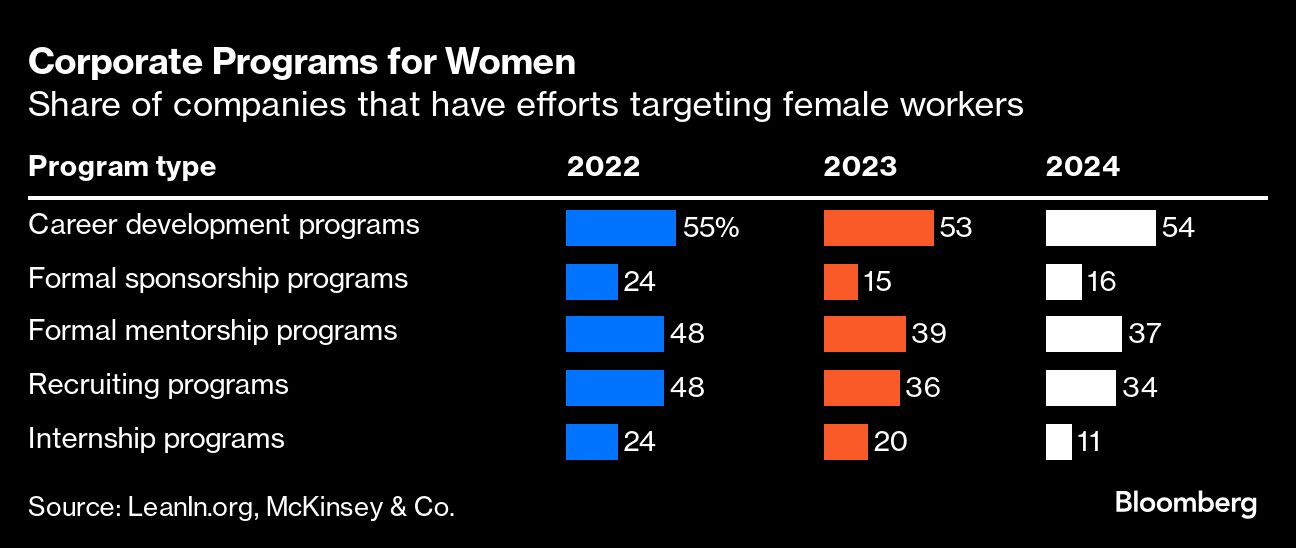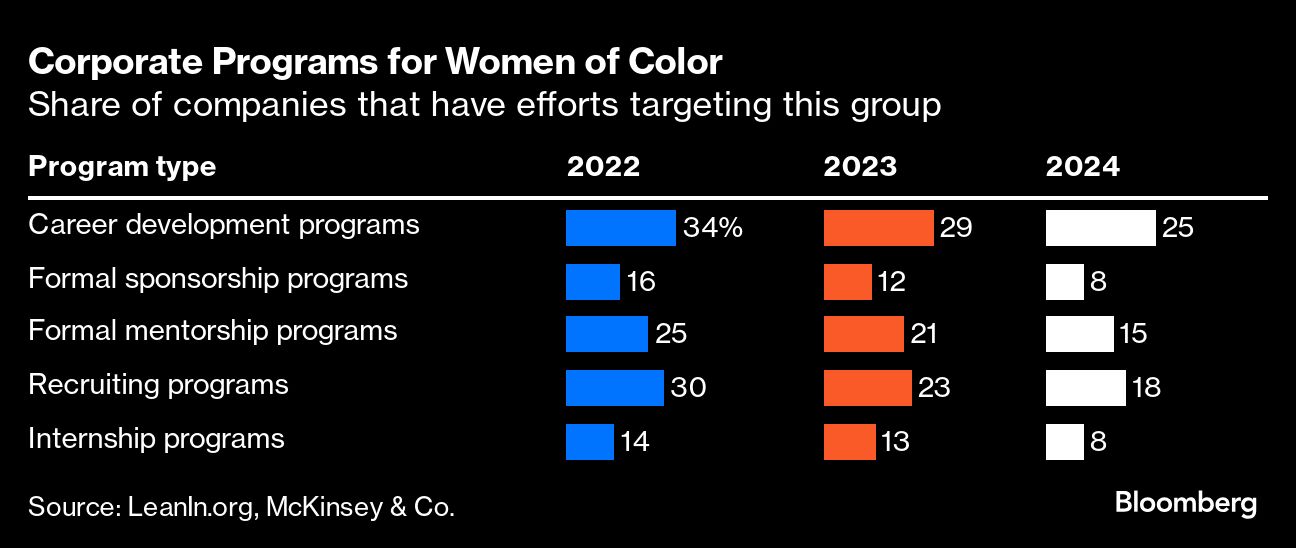Amid a DEI backlash in corporate America, employers are cutting programs meant to boost the careers of women and grow the pipeline of female workers, with the pullback especially sharp for programs supporting women of color.
Only 37 percent of companies surveyed by LeanIn.org and McKinsey & Co. now say they have formal mentorship programs for women, down from 39 percent a year ago and 48 percent in 2022. The number of firms reporting they have recruiting and internship efforts focused on female workers also fell.

Large companies including Mastercard Inc. and Cigna Group are reaffirming commitments to diversity, equity and inclusion initiatives, even amid mounting political attacks. JPMorgan Chase & Co. CEO Jamie Dimon earlier this month said DEI is “good for business” and “morally right.” But roughly half a dozen large companies, including Ford Motor Co., Lowe’s Cos. and Harley-Davidson Inc., have scaled back some of their diversity policies in recent months, and the number of companies to even identify DEI as a priority has been waning. Some 78 percent of companies surveyed by LeanIn and McKinsey said gender diversity is a high priority, down from 87 percent in 2019. When it comes to racial diversity, 69 percent of companies say it’s a high priority, down from 77 percent five years ago.
The availability of programs for women of color has been especially vulnerable over the past two years, with companies reporting declines in every type of program measured by the survey.

“We know that women are having a different experience than men; we know that women of color are having an even worse experience than White women and than women overall,” Sheryl Sandberg, the founder of LeanIn and the former chief operating officer of Meta Platforms Inc., said in an interview. “So, we need mentorship and sponsorship programs that are specifically designed for them.”
Efforts to support women at work make good business sense and aren’t disadvantaging anyone else, Sandberg argued.
“Promoting and supporting equality and equal opportunity and decreasing bias in the workplace for women and women of color does not come at the expense of men,” she said. “If you’re a man in the workforce, whether you’re the most junior or the most senior, if you can work better with half the population, you’re going to do better. Your team is going to outperform. You’re going to outperform.”
This year, LeanIn and McKinsey surveyed 280 companies with more than 10 million employees across the U.S. and Canada. The two organizations have been conducting one of the largest analyses of women at work since 2015.
Conservative social media influencer Robby Starbuck has claimed credit for reductions in DEI programs at a string of U.S. companies in recent months, while activists Edward Blum and Stephen Miller have filed lawsuits and regulatory complaints taking aim at similar efforts, citing discrimination against White men.
The pullback in commitments is “one of the more concerning findings, if not the most concerning finding” this year, said Rachel Thomas, co-founder and chief executive officer of LeanIn.
“We’re at a moment where companies have momentum in many areas and we need them to keep going,” she said.
There has been progress in representation of women in the highest rungs of corporate America, though LeanIn and McKinsey see it as fragile, in part due to headwinds around diversity efforts.
Women today make up 29 percent of C-suite positions, up from 17 percent in 2015, the year the report first came out. In many cases, gains were due to firms adding a role and placing a woman into it — unsustainable for continued advances. And the first step into management, which researchers call the “broken rung,” still remains a large barrier for women, and women of color especially.
Still, the ambition to move up remains the same: the study found that 7 in 10 women want to be promoted in the coming year, the same level as their male counterparts.





















 Winter Storm Fern to Cost $4B to $6.7B in Insured Losses: KCC, Verisk
Winter Storm Fern to Cost $4B to $6.7B in Insured Losses: KCC, Verisk  Earnings Wrap: With AI-First Mindset, ‘Sky Is the Limit’ at The Hartford
Earnings Wrap: With AI-First Mindset, ‘Sky Is the Limit’ at The Hartford  Chubb CEO Greenberg on Personal Insurance Affordability and Data Centers
Chubb CEO Greenberg on Personal Insurance Affordability and Data Centers  Flood Risk Misconceptions Drive Underinsurance: Chubb
Flood Risk Misconceptions Drive Underinsurance: Chubb 




